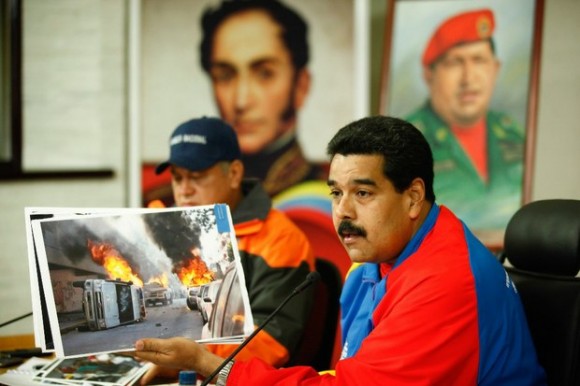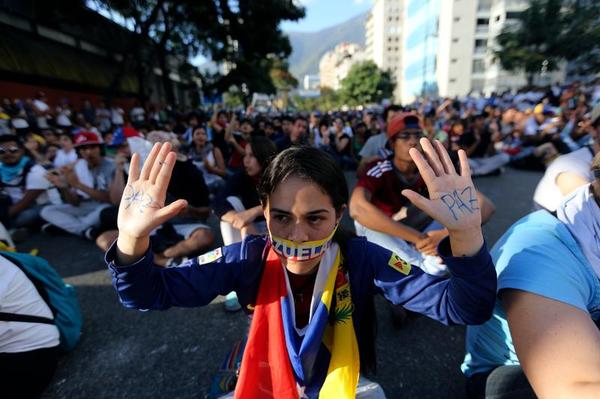THE DAILY EVOLVER LIVE EPISODE 87

President Maduro denounces the violence of some demonstrations in Caracas and expels three US diplomats. In the background, the ubiquitous portraits of Bolivar and Chavez.
With so much of the world’s attention focused on Vladimir Putin and the struggle in Ukraine it’s easy to miss another important real time story of a nation in a similar developmental crisis: Venezuela, where the leaders exhibit some modern exteriors but deep pre-modern interiors.
Since February the country has seen hundreds of thousands of citizen protests in the streets of Caracas and other major cities. Economically the country is in free fall. Inflation is at 56%, and there are shortages of basic goods such as bread, meat and electricity. Venezuela is a leading producer of oil and yet the people have to wait in line for gasoline. International businesses are suspending operations and several airlines have stopped service. It has one of the highest murder and crime rates in the world, and is seen as one of world’s most corrupt economies.
My guest on the call — live from the capital city of Caracas — is Dr. Teresa Sosa, professor in the Graduate School of Political Science at Simon Bolivar University. Teresa describes a country of people who are struggling to make sense of what is going on, in large part because they oriented to the past rather than the future and are fixated on the heroic story of Simon Bolivar who led Venezuela to independence from Spain in the early 1800’s. This glorious history has ongoing resonance with the Venezuelan people and is the root myth with which the modern Bolivarian Party of Hugo Chavez came to power in 1999.
From a integral perspective, Hugo Chavez is quite an interesting character. Dead just a year he remains a hero to the poor in Venezuela. He was an unabashed socialist and said capitalism was a menace that produced poverty. He called for new moral architecture for society, and economic systems built on cooperation not competition. Unafraid of being an international outcast, he was friend of Fidel Castro, Muammar Gaddafi and Mahmoud Ahmadinejad, and called for the liberation of his people from US imperialism and what he referred to as the North American Empire.
Notwithstanding his rhetoric, what Chavez actually achieved is the mess that Venezuela is in right now. His successor, Nicolas Maduro has essentially continued Chavez’s policies for the past year. The political opposition to the government, as with the opposition movements in the Middle East and most recently in Ukraine, consists of students, the middle class and educated people who want to join the modern world. It is also being joined by people in all classes who are unemployed and struggling under the economic deprivations.
The problem with 20th century socialist movements is that although they may use the tools of modernity, they are pre-modern in their souls. They really don’t know how to run a modern government or economy. The police are used as much to contain opposition as to enforce civil order. Judges and the courts, likewise, are corrupted by the rule of powerful people rather than the rule of law.
Chavez, Castro and the like have a sincere belief that they are building a better world, but their thinking is still fundamentally tribal. They have a cartoon vision of the oppressed good guys overcoming the corrupt capitalist system. Of course there is plenty for them to work with in vilifying the capitalists, as developing countries often go through a period of being exploited by more developed neighbors. The US certainly can not claim clean hands when it comes to Latin America, and indeed has supported dictators and corporate fiefdoms through much of the 19th and 20th Century. The karma of this oppression gives the “US is the great Satan” story its power, and Chavez and now Maduro have used it skillfully to maintain their popular support.
This story of being at war with the Imperialist West who is seeking to “undermine the country (and government), rob us of our resources and degrade our culture” is being used by Vladimir Putin in Russia, Recep Tayyip Erdogan in Turkey, Hamid Karzai in Afghanistan and other leaders who are able to ring this pre-modern bell for their pre-modern constituents. (Pre-modern xenophobia also resonates with a paranoid nationalism in the U.S. as well, as shown by the legislation that has been considered in more than two dozen states to prohibit judges from consulting sharia law.)
But at Red and Amber stages of development the oppressed can quickly become the oppressor — because oppression is how power is exercised in the pre-modern mind.
In Venezuela we see brutal crackdowns on protesters by paramilitary groups, including special forces brought in by Maduro from Cuba. The leading opposition leader, Leopoldo Lopez, has been arrested and a second leader, Maria Corina Machado is facing charges that may result in her arrest as well.
Hugo Chavez has been a darling of the International Left, and the Bolivarian revolution still has a lot of support from the more ideological members of the Green altitude. In the spirit of “the enemy of my enemy is my friend” the lefties thrilled to Hugo Chavez’s demonization of the U.S. and especially his favorite target, George W. Bush. Will we ever forget his speech to the U.N. General Assembly where he referred to Bush as “the devil” and waved away the smell of the sulfur as he made the sign of the cross and looked upward for the blessing of God?
But opposition is not a political agenda, the fear of an enemy is not a long-term leadership strategy, and it turns out that Red/Amber strong men aren’t very good at building an economy or a better life for their people. Dr. Sosa has a powerful integral analysis of what is happening in the country. She sees a country where even the most progressive forces are hobbled by pre-modern attitudes:
Venezuela has been living in the rearview mirror. That is, we’re in the twenty-first century living with the foundational myth of our independence by Simon Bolivar. The heroic myth of Bolivar has been told over and over, but he only saw the independence from Spain — he wasn’t able to structure the society or democratic freedom and justice that he had thought of, so it was kind of hanging there in the unconscious.
In the foundational myth, they need to create an enemy. Before,with Bolivar, it was Spain. In the twentieth century you have Hugo Chavez and he needs to create an enemy. He takes the Castro and Leninist discourse the enemy of course has to be the most powerful nation of the world, it has to be the United States.
Chavez put on the table something that was important, that needed to be seen. It was the poverty and marginality of this country. We are an oil producing country with a small population and yet we had immense poverty. That needed to be put on the agenda as something to be seen and we needed good social politics.
But a hero never creates institutions, they don’t build society, they don’t build civilization. Heroes go to battle and they either win or lose the battle.
And yet, more and more people are protesting and are uniting themselves with the vision and the energy of the young people, the students. These students for the first time are coming out of the collective mind into the personal mind. They say “I don’t want to live in this type of society, I don’t want to live under the dictatorship of Maduro and Castro from the island of Cuba” I don’t! The “I” has become the subject. Before that “I” was nonexistent. We were always in the collective, the “we”.
The young people don’t have fear. They speak out.
Are we witnessing a Venezuelan Spring, or just the beginning of a hard winter? I think the long-term trajectory is clear: modernity emerges in Venezuela with full civil freedoms and a vibrant economy that creates wealth for the people. But how long it will take and how much more suffering it entails remains to be seen.
Listen to an excerpt here. The full audio is on Integral Life.
Podcast: Download
Subscribe: Google Podcasts | RSS







Hi Jeff,
This series have been great. Actually, I should get on your weekly calls. I have not read this piece yet. Just wanted to share that N.Korea situation (because of what is in news about firing of shots in the Korean peninsula) and the issues with that region is one important area to delve into. I think that is where most violent Red element is showing up in our globe.
Farzin
Excelent review, I’ve read many thins Teresa Sosa has written, she really knows how to keep me reading. keep up the good work